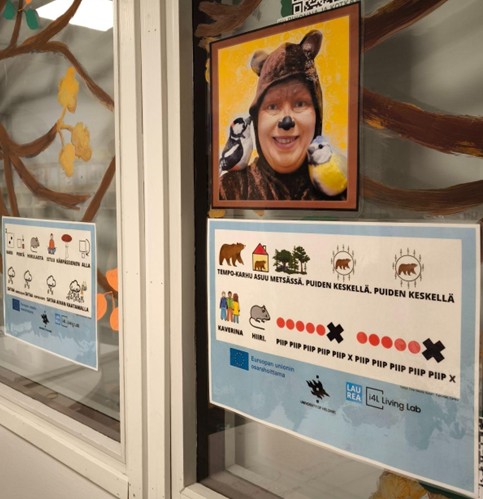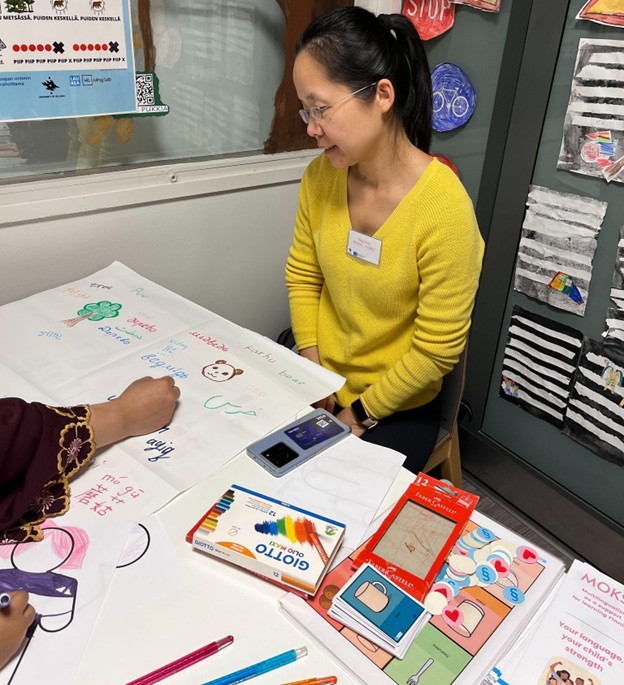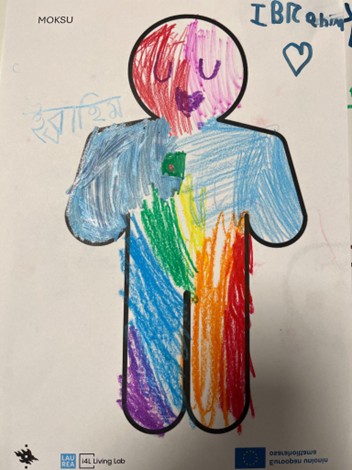Building meaningful collaboration with multilingual parents in early childhood education requires time, trust, and attentive listening. We explore how the VOIKO project and the Rautpiha daycare center in Vantaa are facilitating inclusive language learning by actively engaging families in multilingual activities and celebrating cultural diversity within their community.
Collaboration with multilingual and multicultural families is a common challenge in early years education in the metropolitan area. The Empowering and Inclusive Language Learning (Voimavaraistava ja inklusiivinen kielen oppiminen, VOIKO) project team participated in the Cultural Festival at Rautpiha daycare center in Vantaa on October 30, 2025 . Rautpiha has linguistic and cultural diversity and implements multilingual pedagogy; therefore, being an example of language aware practices for other nurseries in the project. Currently, Rautpiha and VOIKO work together to engage parents more effectively in daily activities and development of multilingualism.
At the Cultural festival, we observed and participated in the activities of the program. We made language portraits to show and celebrate the languages meaningful to the families (Bush, 2018). To make languages visible, we created a “Words in our languages” wall with four Finnish nature words from Tempo Bear’s songs (tree, mushroom, rain, bear). Tempo Bear (Fig. 1) visits Rautpiha weekly with story-based music sessions, and families added these words in their home languages. Based on our observations, that is not a very common practice in daycare centres, even in those with a high number of multilingual children.
 Figure 1. Display of Tempo Bear. Photo by Ying Yang.
Figure 1. Display of Tempo Bear. Photo by Ying Yang.
One of VOIKO’s aims is to bring musical activities as part of the daycare centers’ daily activities. Music enhances language learning (Linnavalli et al., 2018) and promotes inclusivity and the sense of belonging (Pearce, Launay, & Dunbar, 2015). At the festival, we invited the audience to sing a multilingual greeting song. Using the melody of a familiar nursery song “Leppäkerttu moi”, we created new lyrics to include greetings in many languages. A new greeting was added and sung together, creating a lively multilingual moment. The activity aimed to celebrate different languages and show an easy music idea that can be used in daycare to support multilingualism.
The event was bustling with families sharing and eating food that they prepared. Some families engaged with us by coloring the languages that they know and use, on the printed out body and writing the concepts in their own languages on the large sheet of paper (Figures 2 and 3).
 Figure 2. Writing concepts in your own language. Photo by Berenice Rivera-Macias.
Figure 2. Writing concepts in your own language. Photo by Berenice Rivera-Macias.
Talking with parents and engaging with them allowed us to better understand their experiences with language use. Many mentioned speaking both their native language and Finnish. With one parent, a casual conversation mixing Finnish and English gradually revealed his broader language repertoire and stories of learning them. Other parents opened up in a similar way. The Cultural Festival at Rautpiha served as our first contact with families and a chance to introduce our project. The experience showed us that, when given the opportunity, people are eager to share their languages and related experiences. Showing an interest in family languages may be the first key to strengthening collaboration between home and daycare.
 Figure 3. A child’s home language portrait. Photo by Berenice Rivera-Macias.
Figure 3. A child’s home language portrait. Photo by Berenice Rivera-Macias.
The VOIKO project is co-funded by the European Social Fund (ESR+). AI assisted with editing the abstract, which was then modified by the first author.
Authors
- Alina Leminen (PhD, Docent) is a cognitive scientist, who leads a research team Diversity and Multilingualism at Laurea Master’s School Unit. She has conducted research on, e.g., language learning, multilingualism, and speech processing.
- Berenice Rivera-Macias (PhD) is a sociologist and psychologist working at Laurea as RDI Specialist. She has done research, for instance, on topics related to learning and teaching in higher education, and meso- and micro-level experiences of staff at public institutions.
- Ying Yang (M.Ed.) is an education specialist and project planner in the Brain, Music and Learning research group at the University of Helsinki. She has worked on research related to student wellbeing and the role of music in language learning. Her current work explores how music can support multilingualism and inclusion in early childhood education.
References
- Busch, B. 2018. The language portrait in multilingualism research: Theoretical and methodological considerations. Working Papers in Urban Language & Literacies. Paper 236. WP236_Busch_2018_The_language_portrait_i.pdf
- Laurea UAS 2025 Voimavaraistava ja inklusiivinen kielen oppiminen.
- Linnavalli, T., Putkinen, V., Lipsanen, J., Huotilainen, M., & Tervaniemi, M. 2018. Music playschool enhances children’s linguistic skills. Scientific Reports, 8, 8767.
- Pearce, E., Launay, J., & Dunbar, R. I. M. 2015. The ice-breaker effect: Singing mediates fast social bonding. Royal Society Open Science, 2(10), 150221.